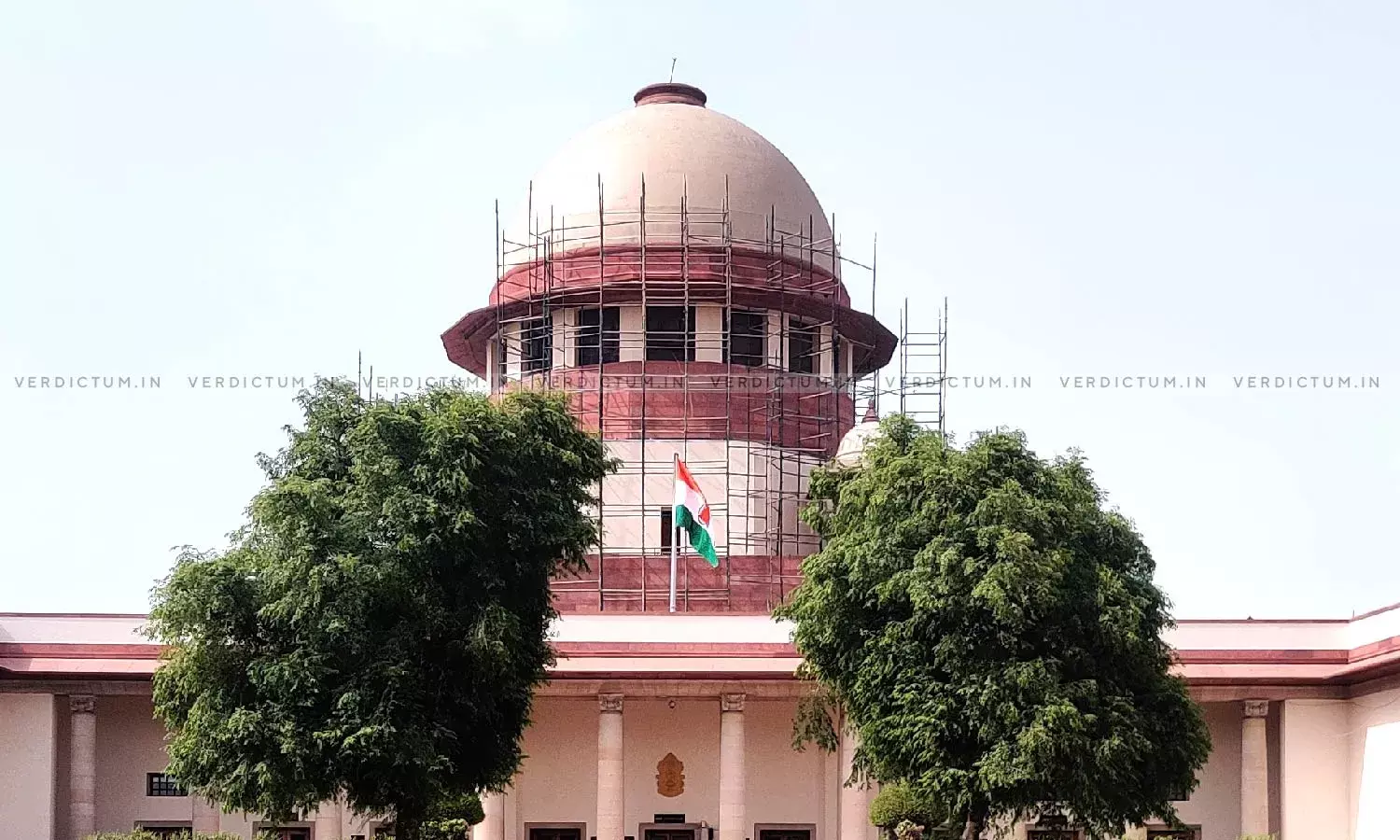Absence Of Direct Seizure Not Dispositive Where There Exists A Pattern Of Covert Coordination: Supreme Court Denies Bail To Mundra Port Drug Case Accused
The Supreme Court dismissed the Appeal against the Gujarat High Court’s decision that denied bail to the accused in connection with an FIR registered by the NIA under the NDPS Act and UAPA.

The Supreme Court denied bail to the Mundra Port drug case accused, while remarking that even though no heroin or narcotic substances were directly recovered from the consignment linked to the accused, the absence of direct seizure is not dispositive, particularly where there exists a pattern of covert coordination.
The Court dismissed an Appeal against the decision of the Gujarat High Court that denied regular bail to the accused in connection with an FIR registered by the National Investigation Agency under Sections 8(c), 21(c), 23(c), and 29 of the Narcotic Drugs and Psychotropic Substances Act, 1985 (NDPS Act), Sections 17, 18, and 22C of the Unlawful Activities (Prevention) Act, 1967 (UAPA), and Section 120B of the IPC.
A Bench of Justice Surya Kant and Justice Nongmeikapam Kotiswar Singh held, “The rigour of Section 43D(5) of the UAPA would, however, in an appropriate case yield to the overarching mandate of Article 21 of the Constitution, especially where the trial is inordinately delayed or where the incarceration becomes punitive. However, such relaxation cannot possibly be automatic and must be evaluated in light of the specific facts and risks associated with each case, as has been previously clarified.”
Senior Advocates CA Sundaram, Siddharth Bhatnagar and Aditya Sondhi represented the Appellant, while ASG Aishwarya Bhati appeared for the Respondent.
Brief Facts
The FIR arose from investigations into a multi-jurisdictional narcotics smuggling operation allegedly executed by Afghan-based syndicates, with links to domestic operatives, wherein substantial quantities of heroin were illicitly brought into India under the cover of commercial consignments through Mundra Port, Gujarat.
Court’s Reasoning
The Supreme Court held that “we are of the view that the Appellant has not been able to make out a case for grant of regular bail at this stage…We say so for the reason that despite no direct recovery of contraband effected from the Appellant, the Prosecution’s case is that he played a coordinating and enabling role in facilitating the import of narcotics concealed as talc through M/s Magent India—which he allegedly controlled through a proxy. The consignment, although not seized with heroin, shares structural and logistical similarities with those where heroin was ultimately found.”
“The charge against the Appellant must also be evaluated in light of the broader matrix of facts, including (i) his alleged meetings in Dubai with a principal foreign accused; (ii) the transfer of documents through intermediaries for the clearance of a flagged consignment; (iii) efforts to retrospectively fabricate invoices and assign responsibility to others; (iv) the use of multiple firms allegedly connected to him to obfuscate the true nature of the transactions; and (v) his telephonic calls to certain co-conspirators. These aspects, supported by the statements of protected witnesses and circumstantial linkages, currently meet the threshold of prima facie satisfaction regarding the Appellant’s complicity,” the Bench remarked.
“This Court is cognizant of the fact that no heroin or narcotic substances were directly recovered from the consignment linked to the Appellant. However, the investigative narrative does not rest solely on physical recovery but proceeds on the basis of conspiracy and facilitation. In such cases, the absence of direct seizure is not dispositive, particularly where there exists a pattern of covert coordination, fictitious entities, and barter-based compensation— features which, according to the prosecution, mark the smuggling architecture employed in the present matter,” the Court explained.
The Bench further stated, “The Appellant faces serious charges, which allegedly carry grave societal ramifications, including the facilitation of cross-border drug trafficking—an offence with well-documented links to organised crime and public health degradation. The seizure in the connected consignment is part of what the Prosecution claims to be the largest heroin bust in Indian history, valued at over INR 21,000 crores. The scale and sophistication of the operation, involving foreign syndicates, shell firms, medical visas, and false documentation, elevates this case far beyond routine NDPS violations.”
Consequently, the Court remarked that “we deem it necessary to clarify that, at this stage, it would be premature and speculative to extend the allegations against the Appellant to the domain of terror financing. While the prosecution has invoked provisions of the UAPA and has broadly linked the smuggling enterprise to trans-national syndicates with suspected affiliations, there is no compelling reason to currently link the Appellant and proscribed terrorist organisations, either within or outside the country. The evidentiary foundation to sustain such a grave allegation must be clear and compelling—something that, can be seen only after a substantial portion of evidence is led by both the parties.”
Accordingly, the Supreme Court dismissed the Appeal.
Cause Title: Harpreet Singh Talwar @ Kabir Talwar v. The State of Gujarat (Neutral Citation: 2025 INSC 662)
Appearance:
Appellant: Senior Advocates C.A. Sundaram, Siddharth Bhatnagar and Aditya Sondhi; AOR Rohini Musa; Advocates Nipun Katyal, Namboodiri Prasanna, Dhananjay Kumar, Nadeem Afroz, Manan Sharma, Rijuk Sarkar and Nidhishree B V
Respondent: ASG Aishwarya Bhati; AOR Arvind Kumar Sharma; Advocates Radhika Misra, Shivika Mehera, Rajat Nair, Sandeep K. Sadawarte, Zeenat Malick, Tanvi Dubey, Aaditya Shankar Dixit, Rajendra Singh Rana and Sarthak Karol

